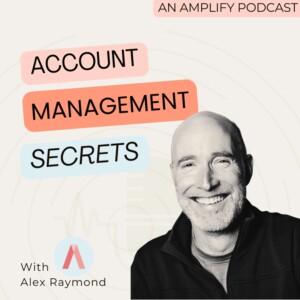
Friday Oct 11, 2024
Episode 6: Mastering the Art of Win Backs and Renewals with Tim Riesterer
“Winning somebody back who had experiences with you is easier than taking net new share. You need to understand why they left because certain reasons for leaving are more likely to result in a potential opportunity for a win back than others,” says Tim Riesterer, Chief Strategy Officer at Corporate Visions. He sits down with Alex Raymond in this episode to talk about the expansion sale and the nuances of customer recovery, stressing the importance of understanding why clients leave in the first place. So, why do customers actually walk away? In Tim’s experience, clients who leave over service issues are often more open to coming back than those who switch to a competitor. This makes a well-thought-out recovery plan crucial to winning them back.
Tim introduces “strategic altitude,” which is all about maintaining a big-picture view that aligns with your clients’ broader business objectives. How can account managers handle tough conversations after a service failure? Tim advises focusing on restoring value and demonstrating a commitment to improvement. In fact, these challenges can actually become opportunities to build stronger relationships. By communicating proactively and keeping long-term partnership goals in sight, account managers can position themselves as strategic advisors—helping drive both retention and growth in a competitive market.
Quotes
- “Winning somebody back who had experiences with you is easier than taking net new share. You need to understand why they left because certain reasons for leaving are more likely to result in a potential opportunity for a win back than others.” (04:25 | Tim Riesterer)
- “I think the one thing we always see lacking is just sort of the general agreement that here’s what we’re all working towards. And it isn’t just, ‘here’s the project goals,’ but what were the business goals that caused everybody to decide to take this journey? And what are the corporate impacts of that if we do this right? We call it a triple metric. Project goals. Measure those. But how do those translate to the business outcomes that people wanted? And how does that then impact the ultimate strategic direction impact of the business? Like, daisy chain that thing up. One, two, three, triple metric. And that becomes your guiding story.” (19:50 | Tim Riesterer)
- “The problem is we always say you get delegated to who you sound like. Too many project plans and too many account management strategies do not sound like the people with strategic altitude. So, what kind of business acumen or what kind of financial acumen are you bringing to the table that surrounds the project?” (27:10 | Tim Riesterer)
- “The good news is there’s a concept called the ‘service recovery paradox.’ It’s a paradox for the very reason that you’re experiencing a service problem. But if you recover well, you can achieve greater awareness, advocacy, and loyalty after the problem is rectified than if you had never had a problem in the first place.” (32:00 | Tim Riesterer)
Links
Connect with Tim Riesterer:
Website: https://corporatevisions.com/
Website: https://emblazegrowth.com/
Connect with Alex Raymond:
LinkedIn: https://www.linkedin.com/in/afraymond/
Website: https://amplifyam.com/
No comments yet. Be the first to say something!